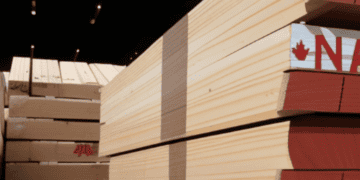Canadian lumber producers are advocating for the initiation of talks with the United States for a new softwood lumber agreement. This move comes with the hope of reclaiming billions of dollars paid in anti-dumping and countervailing duties since 2017, when these tariffs were imposed by the Trump administration.
Susan Yurkovich, president of the British Columbia Lumber Trade Council, has argued that the tariffs were unjustified, stating the need for the repayment of these funds. The issue was brought to the forefront during a meeting between Canadian Prime Minister Justin Trudeau and U.S. President Joe Biden at the recent G-7 summit.
Despite requests, the Biden administration has not yet agreed to negotiate a new deal. However, U.S. Commerce Secretary Gina Raimondo has acknowledged the concerns of the National Association of Home Builders regarding the impact of high lumber prices on housing costs.
Canada’s Trade Minister, Mary Ng, has consistently raised this issue with U.S. counterparts. The U.S. Lumber Coalition, which accuses Canada of unfair trading practices, expresses willingness for a new agreement, provided Canada shows serious intent for negotiations.
U.S. Trade Representative Katherine Tai and spokesperson Adam Hodge have indicated that any new agreement would require addressing Canadian policies, including stumpage fees, which the U.S. contends are unfairly low.
A historical precedent exists for the U.S. refunding duties: in a 2006 settlement, the George W. Bush administration returned $4.4 billion of the $5.4 billion collected on Canadian imports, following WTO and NAFTA dispute settlement panel rulings.
The 2006 agreement, which expired in 2015, allowed Canadian provinces to regulate lumber trade through taxes or a combination of quotas and taxes. After its expiration and a grace period, the U.S. lumber industry petitioned for new duties, leading to the 2017 tariffs under the Trump administration.
Canadian lumber companies have paid over $4 billion in duties since then, a burden compounded by the Commerce Department’s plan to increase duty rates. High lumber prices have also made it challenging for U.S. producers to claim harm from Canadian imports.
Yurkovich refutes claims that Canadian lumber is unfairly subsidized, emphasizing the need for a stable North American lumber market. The Canadian government remains focused on defending its lumber industry through rules-based dispute mechanisms under WTO, USMCA, and NAFTA agreements.
Stay current with supply chain report news at The Supply Chain Report. For international trade resources, visit ADAMftd.com.
#CanadianLumber #SoftwoodLumberAgreement #USCanadaTrade #LumberTariffs #TradeNegotiations #HousingCosts #LumberIndustry #USMCA #WTO #NAFTADisputes #DutyRefunds #SustainableForestry















